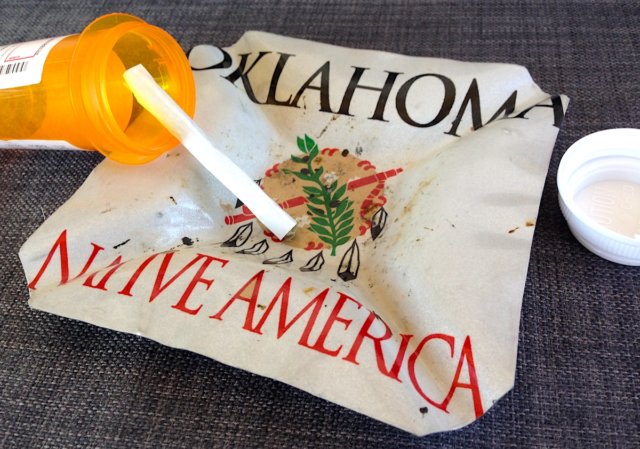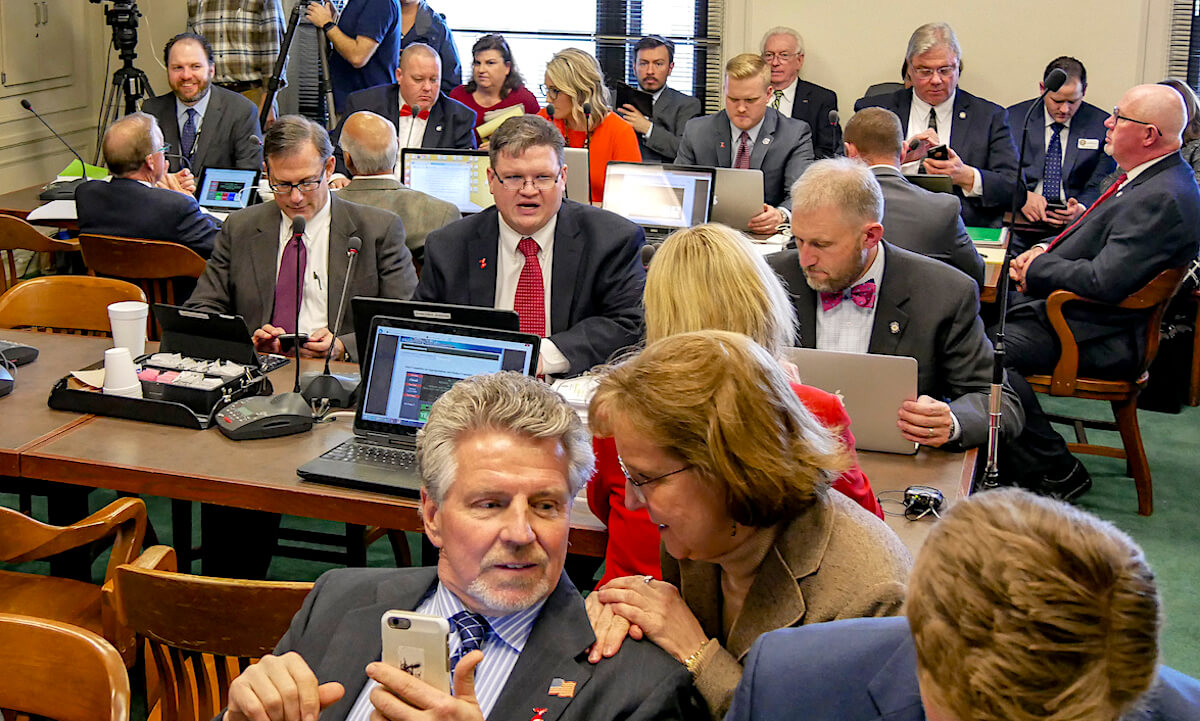
Medical cannabis advocates and state business leaders have been reviewing 300-plus pages of potential legislation that would establish a regulatory framework for medicinal marijuana — and address concerns from employer groups — should State Question 788 pass on June 26.
But whether the Legislature will consider the comprehensive proposal before adjourning sine die (as early as Friday, May 4) remains to be seen, with House GOP leadership supporting action yet saying the Senate appears less interested.
“I’m going to review this language over the weekend, but at this point there are only two ways to get a bill,” House Majority Floor Leader Jon Echols (R-OKC) said Thursday. “One is through JCAB, and one is through a Speaker-Pro Temp bill, and we have been informed that the Senate would not like to take up the issue this year.”
Those supportive of the proposed regulatory framework — both medical cannabis proponents and business groups — are concerned that the Senate may oppose taking action.
“We’ve actually talked to Senate leadership about our desire to get something through this session as well,” said Oklahoma State Chamber of Commerce vice president for government affairs Adria Berry. “It wasn’t a ‘Yes’ or ‘No.’ It was a ‘Thank you for letting us know there are employment concerns.’ So I need to follow back up to see if there is any way to push a little harder.”
Asked Thursday about the situation, Senate President Pro Temp Mike Schulz (R-Altus) said he has formed an informal working group of about a half-dozen senators “who have had an interest already” in the issue.
“We’re having some discussions about it. I have informally put a group together to look at it a little deeper to see if we need to do something preemptive or wait until after (June 26),” Schulz said. “It’s on our radar. It’s being discussed. But we haven’t made a final decision yet.”
‘What a functional medical marijuana program would look like’
Schulz said he has not received the new medical cannabis regulatory framework proposal, which was drafted by Bud Scott, an attorney and the executive director of New Health Solutions Oklahoma. Scott said he believes the Legislature should pass the framework this session ahead of the June 26 vote.
“It is reflective of what a functional medical marijuana program would look like, and it’s drawn from other states that have successful medical cannabis programs in place,” Scott said. “It is an extensive policy proposal, so there’s a lot there. I think there are probably disagreements between the House and the Senate about how to proceed, and that is effectively what we are trying to navigate right now.”
Scott’s group is a trade association for the budding medical cannabis industry in Oklahoma, and he said he has been working with parties across the spectrum to achieve proper regulation.
“We’ve been consulting with the chambers of commerce on this. We have members of the medical community who are supportive of what we are doing,” Scott said, summarizing his proposed legislation. “There are many, many rules and regulations that provide for how an operation can be financed, what implementation processes look like, how enforcement is done, what quality controls are in place, testing standards and advertising restrictions.”
He called the proposed language “a win-win.”
“All we are doing is trying to mirror those provisions that we see in the most successful jurisdictions,” Scott said. “We see this as a positive for all policy makers involved because they can point to (these rules) being successful and trying to support (…) a functional medical cannabis program.”
The risk of a third special session

While Scott, Berry, Echols and others acknowledge their efforts face a time crunch as the 2018 regular session wraps up, passage of SQ 788 without prior creation of a robust regulatory framework could spawn three words bound to raise blood pressure throughout the Capitol: third special session.
“That is one more reason the House would like to take care of this — to avoid a third special session and the cost associated with it,” Echols said. “I think if [SQ 788] passes, there’s a strong chance [a third special session] could be necessary. But we anticipate this problem. We see it coming. So it would make all the sense in the world to work with the parties now and solve the problem.”
Rep. Emily Virgin (D-Norman) said medical cannabis can ultimately help people and that lawmakers should ensure a safe and responsible regulatory environment for their constituents.
“A regulatory framework could avoid a special session after the state question passed, which would prevent the Legislature from having to spend taxpayer money to address an issue we could have addressed in regular session,” she said. “We owe it to the voters and those who would be helped by this law to be prepared for its passage.”
Scott agreed.
“If we do not address something prior to this legislative session adjourning, then we absolutely have to come back into special session to pass comprehensive regulations for the medical cannabis program,” he said.
Will chambers of commerce oppose SQ 788?
While the Oklahoma State Chamber has interest in the Legislature addressing the statutory issues it has raised about SQ 788, some proponents of the ballot measure worry that failure to advance the regulatory framework will result in one or more chambers of commerce spending money against the state question.
“If something is addressed this session, then that makes it less likely that we would have to be involved in something like [an opposition campaign],” Berry said, noting that she was encouraged by what she has read of Scott’s proposed language. “I’m still working through it. But it was a good-faith effort, and it has language from employment attorneys that we saw beforehand and that we wanted in there, and we know that is in there.”
Virgin said she supports legislative action on Scott’s medical cannabis regulations this session.
“This framework would provide some interest groups like chambers of commerce with the legal certainty they need to ensure they won’t oppose this important measure,” Virgin said. “We owe it to the voters and those who would be helped by this law to be prepared for its passage.”
Earlier in session, Rep. John Paul Jordan (R-Yukon) had carried his own regulatory framework bill — a mild 186 pages by comparison — that ultimately stalled. While he said the late timing of Scott’s proposal could be problematic, Jordan believes doing something proactive would be preferable to waiting and seeing.
“It’s a lot easier to put the saddle on the horse before it’s out of the barn and out in the field,” Jordan said.
The attorney, former educator and now judicial candidate said failure to address chamber of commerce concerns could draw additional money into the developing opposition campaign, but he said it might not matter.
“When I talk to folks, a lot of them have already made up their minds. They’ve known about this being on the ballot for two years,” Jordan said. “And it’s not like other state questions where it is in a mixture of several state questions on the ballot. This is the only state question that will be on the June 26 primary ballot.”
Echols said he has heard a lot of fear around the medical cannabis ballot question, including the employer concerns that Scott and Berry said would be addressed in the proposed regulatory framework.
“The other fear is ‘taking a stance’ on medical marijuana if you don’t have to,” Echols said of hesitant lawmakers. “I have two responses to that: Number one, we’re up here to take stands. That’s why we’re here. Number two, all this bill is saying is, if the people were to decide to do this, we want to run this in an orderly manner.”
Echols pointed to SQ 788’s language that would place regulation under the embattled Oklahoma State Department of Health.
“The drafter (of the state question) sent it to the Department of Health, which made sense at the time. But now we know all the problems at the Department of Health, so we need to move this to the Cannabis Commission,” Echols said. “The Legislature really should pass something this year, not to thwart the will of the people, but to effectuate the will of the people.”
Asked about the situation, OSDH director of communications Tony Sellars provided a statement:
The Oklahoma State Board of Health has authorized OSDH to develop an implementation plan so that the agency will be ready to meet the requirements of SQ 788. Working groups are meeting to ensure that the implementation plan contains all the necessary elements to fully meet the mandates of SQ 788. OSDH will be prepared to carry out the duties as prescribed by law and will provide more information to the public as it becomes available.
Scott said the duties prescribed to the OSDH in SQ 788’s language are insufficient.
“For example, the way 788 currently reads is that the licensing authority has to issue licenses for dispensaries, for processing facilities, for laboratories, for cultivation facilities, for basically a small list of required statuses,” Scott said. “Effectively, it’s that they have to issue licenses to all these different applicants. There are no background checks and no financial disclosures provided, which is not in line with anywhere in the country.”
Scott said he and his organization support SQ 788.
“We definitely support the author’s intentions in its drafting,” he said. “However, as it reads, the Department of Health would have to start issuing permits for all business licenses basically within a month. That’s just really not in line with how a functional medical cannabis program operates. So we believe that having these timelines and procedures spelled out much more fully provides the appropriate amount of time and review and opportunity for objective analysis that such a program should require.”
Echols said he has met with Scott and came away impressed that he knows how medical cannabis programs work across the U.S. Echols emphasized his hope that the Senate agrees to consider Scott’s proposed regulatory framework.
“This is something that is being agreed to by the business community, by the people who wrote 788,” Echols said. “This is actually people on opposite sides of the issue coming together and saying, ‘This is a good idea.'”





















